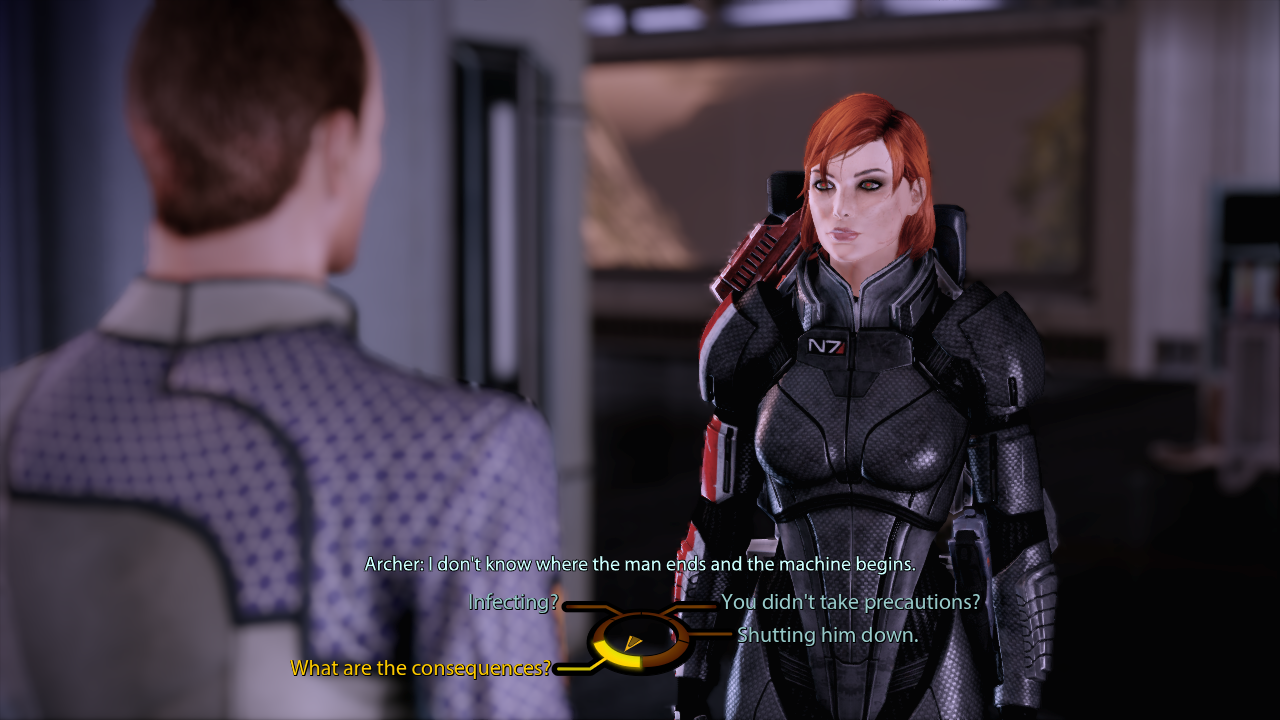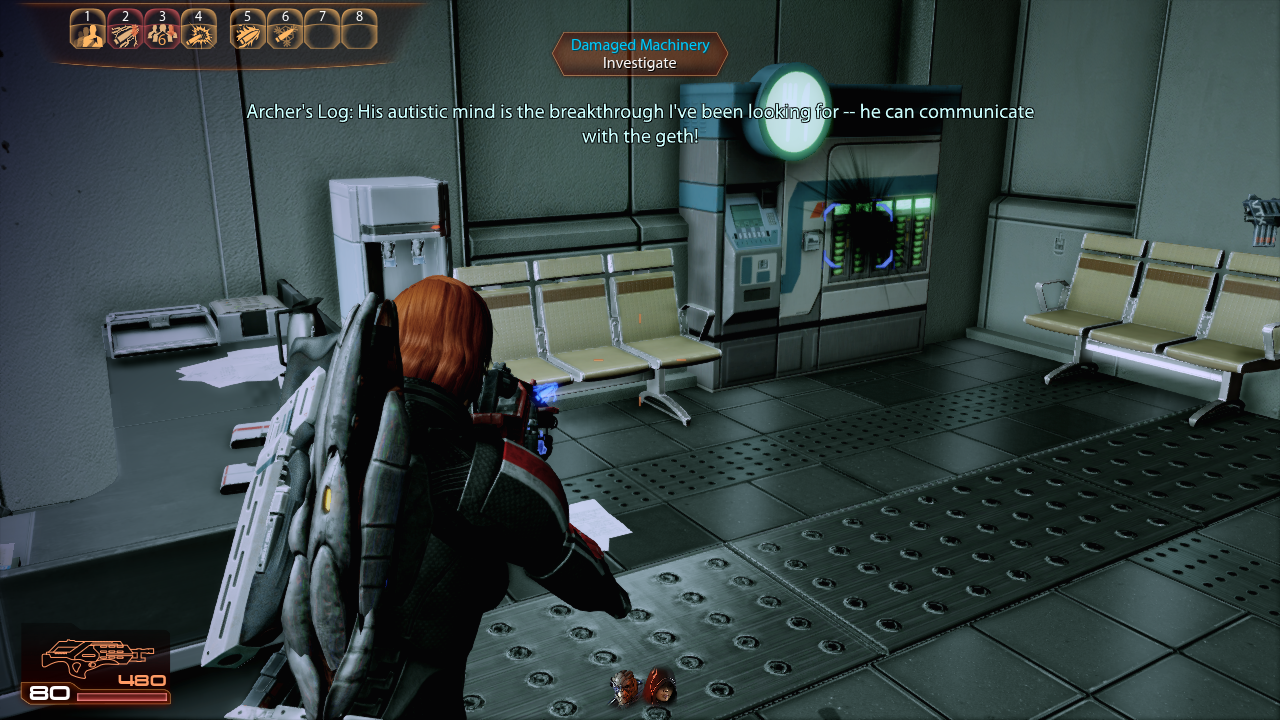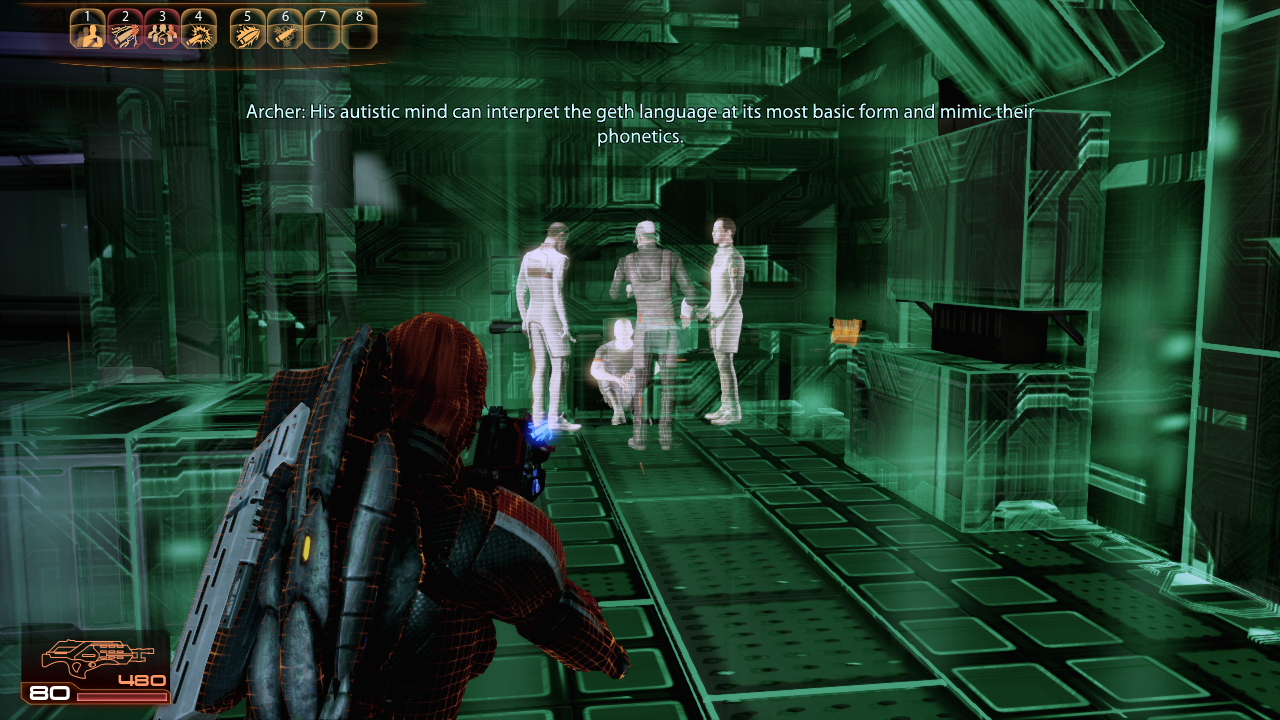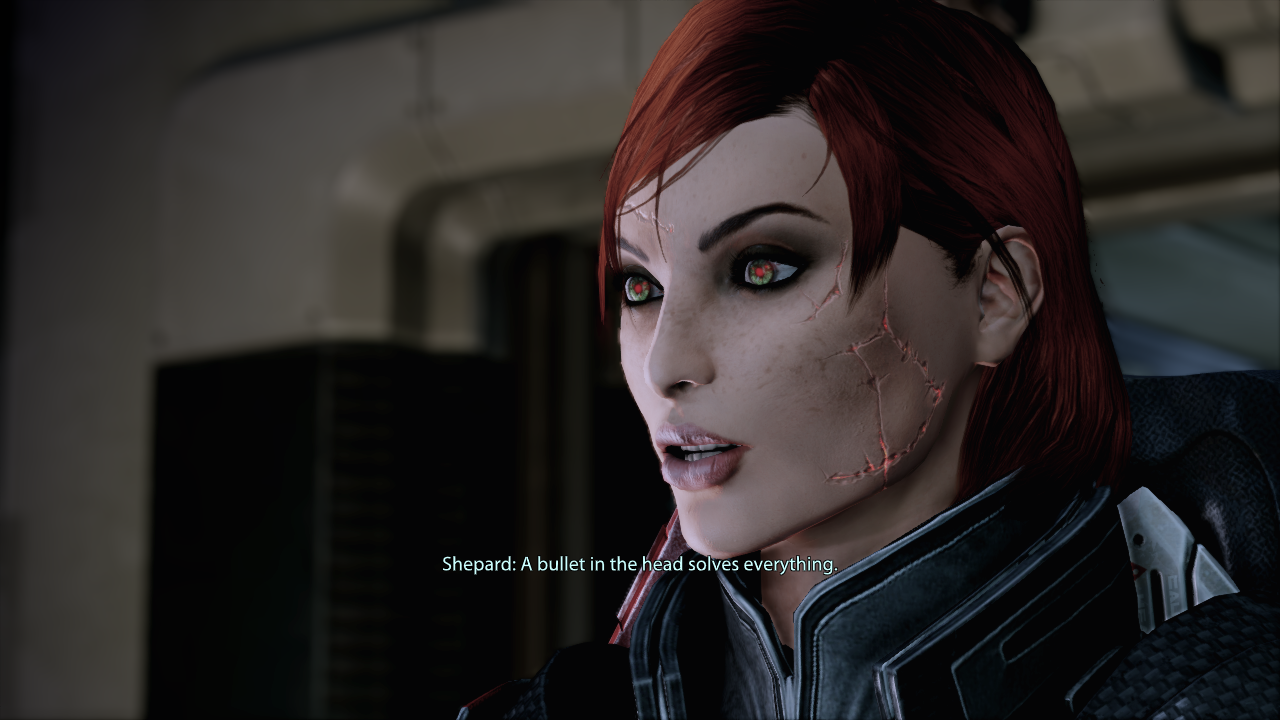About The Mass Effect 2 Overlord DLC And What It Means To Play Through The Series
24 6月 2024

This post describes ableism and media representations of autism from a neurotypical perspective who is dating an autistic partner. There will also be story spoilers for the DLC and discussions of the post-9/11 politics of the series.
The Overlord DLC begins like any other Mass Effect 2 mission: Shepard and their team stumble upon a planet where almost everyone has died and the only survivor is a scientist named Archer. He tells Shepard that a rogue AI has gotten loose, and if they hadn't arrived in time, the rogue AI could have uploaded itself into the universe.
Archer then ordered the team to shut down the rogue AI. The player is dropped into a small open world to explore: they can admire the waterfalls and natural rock formations pointed out by the Hammerhead AI. There are two other bases that the player must explore to unlock the final base that housed the rogue AI and Archer's brother, David.
At this point in the DLC, the player doesn't really know who David is. Archer gives some hints that David merged with the rogue AI and something went wrong. Nothing in the other bases suggests anything else.
However, the rogue AI often screeches and the subtitled text reads "Unintelligible". Scientists who encountered the rogue AI were trapped in the base and felt herded into areas where Geth, an alien machine species that connects to a network, will kill them easily. Before dying, the scientists felt overwhelmed and wanted the rogue AI to shut up.
Once the player enters the final base, logs and flashbacks reveal that Archer had found a way to communicate with the Geth: he could use David's autistic mind to order the Geth around.

When Shepard interfaces with an infected terminal, they are separated from the team and enter a virtual environment that replays David's memories. Here, Archer's motives become clearer: he needed to get results from his research project, so he forced David into the experiment. David is a "mathematical savant" who repeats the square roots of numbers, and his photographic memory allows him to cross-reference the languages "in a snap". As Archer puts it, "he's literally a human computer." He tells his worried assistants that communicating with the Geth should be harmless and that everything should be fine.
David, of course, is terrified. He's overwhelmed by the sounds and wants it all to stop. But the experiment continues.
Shepard finally encounters the rogue AI, now named "David" in the enemy name UI. After the obligatory boss fight, Archer interrupts Shepard and tries to absolve himself of responsibility. He didn't expect David to be so hurt, and he even says that if the project succeeds, David might be in a better place.

The player now has the option of sending David to his doom or taking him away from his brother. I chose the latter without thinking because even though I've played Renegade (bad/evil) options before, I just found it too horrible to consider the alternative.
The Paragon (good/lawful) choice makes Shepard pistol-whip Archer, and David is sent to an academy that deals with people like him. The DLC ends with David repeating the square root of 912.04 and "it all seemed harmless..."
My first reaction to the DLC was confusion. While I'm not a fan of the Mass Effect series, I did enjoy pretending to be a U.S. Supercop and the spectacle of entering various alien planets. The "Overlord" DLC caught me off guard and left me feeling quite revolted.
The way autism is portrayed in the game is much worse than I'm used to seeing in mainstream media. Movies like Good Will Hunting and Rain Man were questionable enough, but this was far more offensive to my sensibilities.
My partner looked at the screenshots and was horrified at how dehumanizing the portrayal of autism was. It's fine for autistic people to refer to themselves as having alien minds because it's kind of a pride thing. But when a neurotypical writer repeats it throughout the game, it's almost as if they're validating the worst myths about how autistic people think and why they should be infantilized.
Every conversation about David was about how much of a savant he was and about the people who decided his every move. Whether you end up violently disagreeing with Archer or not, David never gets a say in where he wants to be except that he didn't want to be here. He had no agency. He was an object to be moved around.
I was curious what autistic Mass Effect fans had to say about this DLC, and surprisingly, many on the Mass Effect subreddit seemed to agree with the portrayal. While there were people who didn't like DLC like me, most fans thought David's experience was validating and kicking Archer's ass was indeed kind of awesome. They also disagreed with a VICE article that claimed the DLC sided with Archer when the narrative was clearly about standing up to ableism. When critics bring up the fact that you can just do the evil option, people also just say, "That's Mass Effect for you. You can do whatever you want because it respects player agency."
I'm not saying they're wrong to find value in this kind of representation. While I see this as another example of tragedy porn and a savior mentality, I understand why autistic fans find this affirming because it was surprising to see Mass Effect take on something more grounded and social. Whatever qualms I had with the game's representation of autism, it at least said that autistic people exist and deserve to be seen as people. Ableism is actually bad. If you are an autistic Mass Effect fan reading this post and disagree with my interpretation, more power to you.
My real issue lies elsewhere. I want to circle back and think about what it means when people say, "That's Mass Effect for you." Throughout the series, you are often presented with important-looking choices that seem to determine the fate of the universe, but are actually cosmetic choices that allow you to roleplay as the Shepard you want to be. Even though I find the post-9/11 vibes of Mass Effect repulsive, I did find some pleasure punching the journalist who tried to interview me in a bad faith way.
Which brings me to Mass Effect's trademark narrative design and why I found this DLC far more atrocious than the usual Mass Effect-isms. I don't think "Overlord" is fundamentally different from other scenarios the game has done, which is why fans usually don't find it dissonant. Objectively speaking, it is just a fun DLC to play through with good setpieces and fun combat encounters.
And I can imagine that there could be another version of "Overlord" that didn't make autism some magical superpower. There could be a more humanizing version, one that gives David agency as a character and allows him to beat up Archer in a way that's more validating than what the game currently offers. In the hands of a better writer, the DLC could be better too, if it had space to interrogate Archer's ableism and space to discuss the marginalization of autistic characters.
But I will still find this hypothetical version flawed because this is Mass Effect as the fans say. The ability to choose outcomes and have the story tailored to allow players to experience a power fantasy as Shepard means that it will always be a story about feeling good and powerful.
For better or worse, the game's main strength is that it privileges the player and lets them beat up straw villains if they choose. The format that Mass Effect has chosen is rather inappropriate for discussing social issues like disability. The antagonists of disability are not individuals like Archer, but the very idea of disability, the ideology that some people are not equipped to live independently because of some arbitrary "handicap". Everyone wants to live and function like everyone else, and in a more just society there will be no advantage or disadvantage as long as everything is taken into account. I do not want to see some people "needing" more attention and care than others, but rather the elimination of inequality altogether.
And this is the opposite of what Mass Effect usually does. Say what you will about how it deals with race and 9/11, but it's much easier to create the strawman of terrorism than the strawman of ableism. It rehearses the arguments the US used to invade Iraq because the game can say, "This person caused the evil.” It's silly and untrue, but people already tend to see dictators and criminals as harbingers of violence. We can see them as villains and revel in the fantasy of overthrowing them to change the world. Something more societal and subconscious, like ableism, is harder to pin on a shitty guy. Taking out Archer doesn't feel like taking out a terrorist.
Playing this DLC made me realize that the Mass Effect series is fundamentally incapable of discussing any topic that requires more than a strawman villain. It's easy, if ridiculous, to imagine Shepard taking down the leader of a racist organization. It's harder to take down a guy who's part of a societal impulse to oppress disabled people and then think David's ableist nightmare is over. Put another way, Shepard can beat up a racist but it would be preposterous to say they can end racism. This is the usual for Mass Effect, but it feels absurd when the game takes on something like ableism, which has no "terrorist" characters.
In a very strange way, the DLC is almost like a Brechtian exercise: it defamiliarized Mass Effect-isms by placing the usual scenarios closer to reality and estranges me from its premises long enough to see how artificial and contrived its narrative design is. If the DLC is just the Mass Effect writers doing what they've always done, but this time it's about autism, what does that say about Mass Effect 2 as a game and its rhetorical tricks? I realized that I was desensitized to violence against alien species because that was what Mass Effect 2 was about, but I started to think differently when the same shit was done to autistic people. It made me realize how the supervillains I was fighting made the fetishism of alien species as subhuman more palatable.
Other than the caricatures of autistic people, I don't think the "Overlord" DLC did anything wrong. It was simply a watershed moment: it revealed that this was what the Mass Effect series had always done, only to people close to me. And I find this fact uncomfortable because it made me realize how susceptible I was to the propaganda efforts of Bush's USA. I was so caught up in Mass Effect's fiction of defeating strawman villains that "Overlord" caught me off guard. I realized I was no different from the liberals who shook their heads when the USA bombed the Middle East because it couldn't be helped.
It was this DLC that made me realize that I was complicit in perpetuating this fantasy that there were named villains of societal ills that could be defeated by playing this game. "Overlord" shattered the illusion by going after something I actually knew, and the game repulsed me because I thought my own philosophies were repulsive. I wasn't principled enough to resist the racist ideas of Mass Effect.
So, I appreciate this DLC for humbling me. As much as I disliked the message, I enjoyed most of the gameplay (okay, I disliked the Hammerhead sequences, but when has the series ever been good about vehicles) and everything else up until that moment. Before the "Overlord" DLC, I was happy to be smug about its message and that I knew better. Now, I'm not so sure I can.
I will end the post not with another screenshot from the DLC, but with another scene from the game:

That scene made me laugh the first time I played it, but it could have been in a possible alternate version of "Overlord". And that scares the hell out of me.